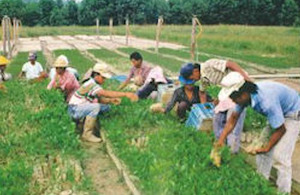DFID Research: The impact of research on Indonesia’s pulp and paper sector
New research has brought about significant environmental and economic improvements to Indonesia’s pulp and paper sector.

Fibre plantations are being established across Indonesia. Picture: CIFOR
Research led by the Center for International Forestry Research (CIFOR) investigating the pulp and paper sector in Indonesia has contributed to policy reform, the acceleration of plantation development, and the saving of more than 100,000 hectares of the world’s most environmentally important tropical rainforest, with hundreds of millions of dollars in attendant benefits.
The research revealed the poor monitoring and weak regulatory environment which allowed Indonesian pulp and paper companies to expand capacities at their mills and to continue harvesting fibre from natural forests at a pace that far exceeded plans to establish plantation fibre supplies. The study was the first to establish quantitative evidence of the effects of the disparity between mill growth and sustainable fibre supplies.
CIFOR’s policy-oriented research has been credited by key NGOs involved in advocacy, the Ministry of Forestry, and the corporations themselves with driving improvements in the sector, including increasing conservation set-asides and accelerating plantation development. From 2009, a Ministerial Decree on the ‘acceleration of plantation development and pulp and paper industry raw material supply’ was adopted, which requires specific improvements in fibre sourcing practices by 2014. As a result of these initiatives, 76,000 to 212,000 hectares (ha) of natural forest will have been saved by 2013.
Read the full version of this case study.
DFID provided core funding for CIFOR’s Programme on the Underlying Causes of Deforestation and, more recently, CIFOR’s Programme on Forests and Governance.
Key references:
- Raitzer, D.A. (2008) Assessing the impact of CIFOR’s influence on policy and practice in the Indonesian pulp and paper sector, Impact Assessment Paper. Center for International Forestry Research (CIFOR): Bogor, Indonesia.
- CGIAR Science Council Secretariat, (2008) Policy and practice in the Indonesian pulp and paper sector: assessing the impact of CIFOR’s research Science Council Brief: Standing Panel on Impact Assessment, Number 25